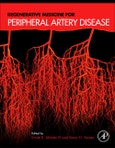Regenerative Medicine for Peripheral Artery Disease is a comprehensive and up-to-date resource on the use of regenerative medicine for the treatment of peripheral arterial disease. This reference includes a general overview of regenerative medicine and covers important vascular topics, including intermittent claudication and critical limb ischemia, with important mechanisms clearly presented in full color images throughout the book. This important reference includes clear and concise information on both human clinical trials, as well as important and pertinent animal studies, and is a must-have reference for researchers and practitioners of peripheral artery disease.
Please Note: This is an On Demand product, delivery may take up to 11 working days after payment has been received.
Table of Contents
Chapter 1: Overview of Various Regenerative Medicine Approaches Chapter 2: Overview of animal data for regenerative therapy Chapter 3: Overview of imaging for angiogenesis Chapter 4: Regenerative medicine for claudication Chapter 5: Regenerative medicine for critical limb ischemia
Authors
Emile Mohler Director, Vascular Medicine, University of Pennsylvania Health System, Professor of Medicine, Perelman School of Medicine at the University of Pennsylvania, Philadelphia, PA, USA.Dr. Emile Mohler III, MD is director of vascular medicine for the University of Pennsylvania Health System, and Professor of Medicine for the University of Pennsylvania School of Medicine, Philadelphia. He has been teaching and mentoring medical students for more than 20 years. A physician specializing in internal and vascular medicine, Dr Mohler practices at the Hospital of the University of Pennsylvania. Currently a member of the Cardiovascular Institute, the Institute for Human Gene Therapy and the Institute for Medicine and Engineering at the University of Pennsylvania School of Medicine, Dr Mohler is also an active member of several academic, scientific, and pharmaceutical committees. He is a fellow of the American College of Cardiology, the Society for Vascular Medicine, the American Heart Association, the College of Physicians of Philadelphia and the American College of Physicians. He has lectured extensively, both nationally and internationally, about a wide range of topics related to his clinical and research interests, including diagnosis and management of peripheral artery disease, vascular imaging, the management of cardiovascular risk factors, various types of coronary heart disease, and the most current treatments for heart disease.
Brian Annex Chief, Division of Cardiovascular Medicine, University of Virginia School of Medicine, Charlottesville, VA, USA.
Dr. Brian Annex, M.D., is board certified in internal medicine, cardiovascular diseases and interventional cardiology. He is currently a professor at University of Virginia. Prior to his arrival at UVA in July 2008, Dr. Annex served as Professor of Medicine in the Division of Cardiovascular Medicine at Duke University School of Medicine. While at Duke, he also served as Vice Chief for the Division of Cardiovascular Medicine. He initiated and then served as Director of Vascular Medicine at Duke as well as a staff cardiologist at the Durham Veterans Administration Medical Center.
Dr. Annex has a long-standing clinical and research interest in peripheral arterial disease (PAD). In addition, Annex's research include understanding the impact of diabetes has among the major risk factors for PAD; the genetics of PAD; links between PAD and coronary artery disease; and novel PAD treatments including gene and cell therapy. He has performed and led numerous studies on angiogenesis (the growth of new blood vessels) and gene therapy to treat several diseases, including PAD. Dr. Annex brings a number of pre-clinical and clinical studies on PAD and angiogenesis, which are funded by the National Institutes of Health (NIH) as well as the American Diabetes Association. He has served on several national programs in PAD. He serves as the Chair on the NIH Study Section on Clinical and Integrative Cardiovascular Sciences.








